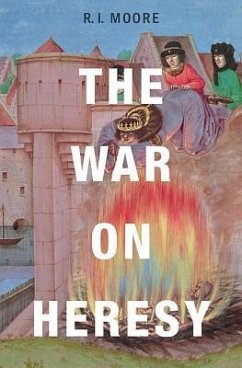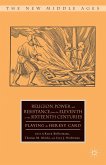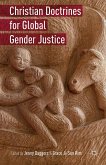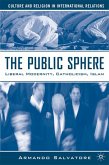Between 1000 and 1250, the Catholic Church confronted the threat of heresy with increasing force. By focusing on the motives, anxieties, and interests of those who waged war on heresy, this book reveals that early heretics may have died for their faith, but it was not because of their faith that they were put to death.
Some of the most portentous events in medieval history-the Cathar crusade, the persecution and mass burnings of heretics, the papal inquisition-fall between 1000 and 1250, when the Catholic Church confronted the threat of heresy with force. Moore's narrative focuses on the motives and anxieties of elites who waged war on heresy for political gain.
Some of the most portentous events in medieval history-the Cathar crusade, the persecution and mass burnings of heretics, the papal inquisition-fall between 1000 and 1250, when the Catholic Church confronted the threat of heresy with force. Moore's narrative focuses on the motives and anxieties of elites who waged war on heresy for political gain.
An intellectual thriller... An absolute page-turner. R. I. Moore's The War on Heresy is ostensibly about the roots of Catharism, and the attempts by the medieval Church to extirpate it. A well-trodden path of enquiry, you might think-except that Moore's thesis is as jaw-dropping as it is original. Far from existing as an independent phenomenon, he argues, Catharism was in truth a phantasm conjured up from the nightmares and ambitions of those who went looking for it. The true begetters of the heresy were not Manicheans mysteriously transplanted from the ancient Middle East to medieval Languedoc, but rather the very men committed to its destruction. The relevance of this for today's world, haunted as it is by its own paranoias and anxieties, hardly needs pointing out. Startling, unsettling and revelatory, The War on Heresy is Homeland in cowls.
-- Tom Holland Globe and Mail
We have not forgotten the Albigensian Crusade, nor its prequel in the heresy campaigns of the twelfth century, but in this fascinating study, the veteran medieval historian R. I. Moore argues with the zeal of a convert that we may have radically misunderstood them. And on that proposition, much in Western medieval history turns... The great virtue of this major recasting of Western history over three centuries is that it sounds right. It sums up more than a decade's worth of growing doubts among many medieval historians about the reality of Cathar dualism. It takes due note of the untidiness of historical developments, and the almost limitless capacity of human beings to believe and internalize the most risible nonsense if it suits them. Yet the rigor of Moore's arguments is a consoling reminder that humans can also be rational beings, capable of empathy with the long-dead, sympathetically comprehending why people have embraced nonsense, and listening carefully to faint voices through a hubbub of misleading background noise. Moreover, we can do so with the consciousness that such a task is a matter of morality, a pursuit of truth and justice, which is among the highest callings we can embrace. R. I. Moore's case is meticulously as well as boldly argued, though medieval historians (some of whom will not like his book one bit) would want more footnotes than a work aimed at the general reader provides. No doubt footnotes will sprout mightily in the debate provoked by this study; and after it all, we will have a renewed picture of medieval Europe.
-- Diarmaid MacCulloch Times Literary Supplement
Moore's approach to Catharism is intriguing and provocative, and it is here that the book will receive its most testing scholarly scrutiny... [It's] an accessible and up-to-date history of the rise of heresy persecution in the medieval West. The book will inspire ample criticism and defenses among scholars. Amateur historians will find a pleasing expository style burnished with colorful details.
-- David J. Collins America
This is a landmark work of history... Quite apart from the gripping stories of heresy, political struggle, crusade, and inquisition, Moore's book succeeds because it is framed as a revelatory and controversial history. It is a scholarly detective story in which the author's enthusiasm for tiny details and problematic sources is as captivating as the human dramas of the individual episodes. It is bound to reach a very wide audience indeed.
-- Ian Forrest American Historical Review
The Cathar heresy, inspiration for the Albigensian Crusade and the Inquisition, remains one of the most infamous belief systems of the Middle Ages... Moore, a leading scholar of medieval heresy, has turned the classic story on its head by suggesting no international heretical movement existed during the Middle Ages. Moore now believes that the historiography of organized medieval heresy is undergoing a sea change. By considering the major reports of heresy from the early 11th century on as each occurred chronologically and on their own terms, he finds no discernible connection between them. Instead, he asserts that educated medieval churchmen invented an international movement in hindsight by seeing trends and connecting dots that were not really there. In challenging a major piece of medieval history, Moore acknowledges that his current ideas invalidate much of his own work and that of other big names in the field of the past 40 years. To his immense credit, he tells this new story in a measured, nuanced, readable account designed for a wide audience.
-- L. W. Marvin Choice
This is a jaw-dropping book-a brilliant demonstration of how Catharism, far from existing as an independent phenomenon, was in truth a phantasm conjured up from the nightmares and ambitions of those who went looking for it. Thrilling, unsettling, revelatory.
-- Tom Holland, author of Millennium: The End of the World and the Forging of Christendom
Fierce competition for power produces fierce discursive competition. In this grand and sane book, armed with many lights (intelligence, narrative skill, learning), R. I. Moore re-enters the territory of Europe's ferocious medieval competition for theological orthodoxy; wherever he ventures, he illumines what had been dark.
-- James Simpson, Harvard University
Beautifully written, measured, searching, and sublimely free from jargon. We are presented with eyewitness accounts that are not knocked into pre-conceived patterns. The effect is to draw the reader into not just the story but into how the story became a story in the first place. Inevitably this affords a double-take perspective, in which history and stories excitingly grow together and the reader becomes a participant.
-- René Weis, University College London
The War on Heresy is social and religious history at its best, the fruit of many decades of intense engagement with one of the most complex and difficult problems of medieval history. With admirable clarity, R. I. Moore tells the deeply troubling story of how heretics became a persecuted minority, not so much because of their beliefs, but because of the anxieties, needs, and ambitions of their persecutors. This is a masterfully researched and deeply thought book that tells its exciting and still relevant story with verve and with sympathy for the victims of the war on heresy.
-- Anders Winroth, Yale University
-- Tom Holland Globe and Mail
We have not forgotten the Albigensian Crusade, nor its prequel in the heresy campaigns of the twelfth century, but in this fascinating study, the veteran medieval historian R. I. Moore argues with the zeal of a convert that we may have radically misunderstood them. And on that proposition, much in Western medieval history turns... The great virtue of this major recasting of Western history over three centuries is that it sounds right. It sums up more than a decade's worth of growing doubts among many medieval historians about the reality of Cathar dualism. It takes due note of the untidiness of historical developments, and the almost limitless capacity of human beings to believe and internalize the most risible nonsense if it suits them. Yet the rigor of Moore's arguments is a consoling reminder that humans can also be rational beings, capable of empathy with the long-dead, sympathetically comprehending why people have embraced nonsense, and listening carefully to faint voices through a hubbub of misleading background noise. Moreover, we can do so with the consciousness that such a task is a matter of morality, a pursuit of truth and justice, which is among the highest callings we can embrace. R. I. Moore's case is meticulously as well as boldly argued, though medieval historians (some of whom will not like his book one bit) would want more footnotes than a work aimed at the general reader provides. No doubt footnotes will sprout mightily in the debate provoked by this study; and after it all, we will have a renewed picture of medieval Europe.
-- Diarmaid MacCulloch Times Literary Supplement
Moore's approach to Catharism is intriguing and provocative, and it is here that the book will receive its most testing scholarly scrutiny... [It's] an accessible and up-to-date history of the rise of heresy persecution in the medieval West. The book will inspire ample criticism and defenses among scholars. Amateur historians will find a pleasing expository style burnished with colorful details.
-- David J. Collins America
This is a landmark work of history... Quite apart from the gripping stories of heresy, political struggle, crusade, and inquisition, Moore's book succeeds because it is framed as a revelatory and controversial history. It is a scholarly detective story in which the author's enthusiasm for tiny details and problematic sources is as captivating as the human dramas of the individual episodes. It is bound to reach a very wide audience indeed.
-- Ian Forrest American Historical Review
The Cathar heresy, inspiration for the Albigensian Crusade and the Inquisition, remains one of the most infamous belief systems of the Middle Ages... Moore, a leading scholar of medieval heresy, has turned the classic story on its head by suggesting no international heretical movement existed during the Middle Ages. Moore now believes that the historiography of organized medieval heresy is undergoing a sea change. By considering the major reports of heresy from the early 11th century on as each occurred chronologically and on their own terms, he finds no discernible connection between them. Instead, he asserts that educated medieval churchmen invented an international movement in hindsight by seeing trends and connecting dots that were not really there. In challenging a major piece of medieval history, Moore acknowledges that his current ideas invalidate much of his own work and that of other big names in the field of the past 40 years. To his immense credit, he tells this new story in a measured, nuanced, readable account designed for a wide audience.
-- L. W. Marvin Choice
This is a jaw-dropping book-a brilliant demonstration of how Catharism, far from existing as an independent phenomenon, was in truth a phantasm conjured up from the nightmares and ambitions of those who went looking for it. Thrilling, unsettling, revelatory.
-- Tom Holland, author of Millennium: The End of the World and the Forging of Christendom
Fierce competition for power produces fierce discursive competition. In this grand and sane book, armed with many lights (intelligence, narrative skill, learning), R. I. Moore re-enters the territory of Europe's ferocious medieval competition for theological orthodoxy; wherever he ventures, he illumines what had been dark.
-- James Simpson, Harvard University
Beautifully written, measured, searching, and sublimely free from jargon. We are presented with eyewitness accounts that are not knocked into pre-conceived patterns. The effect is to draw the reader into not just the story but into how the story became a story in the first place. Inevitably this affords a double-take perspective, in which history and stories excitingly grow together and the reader becomes a participant.
-- René Weis, University College London
The War on Heresy is social and religious history at its best, the fruit of many decades of intense engagement with one of the most complex and difficult problems of medieval history. With admirable clarity, R. I. Moore tells the deeply troubling story of how heretics became a persecuted minority, not so much because of their beliefs, but because of the anxieties, needs, and ambitions of their persecutors. This is a masterfully researched and deeply thought book that tells its exciting and still relevant story with verve and with sympathy for the victims of the war on heresy.
-- Anders Winroth, Yale University







